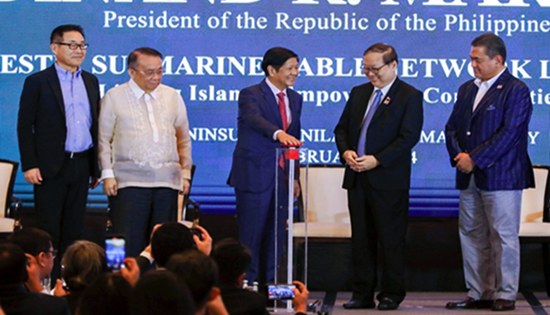PBBM inaugurates BOI-registered
submarine cable project
|

Making
faster internet speed happen in the Philippines: President
Ferdinand R. Marcos, Jr. (middle) led the lighting-up
ceremony for the Express Route of the InfiniVAN-initiated
Philippine Domestic Submarine Cable Network (PDSCN) in
Makati City on February 15, 2024. |
By
DTI-Board of
Investments
February 20, 2024
MAKATI CITY – Japan
stands as a cornerstone of foreign direct investments (FDI) for the
Philippines and tangible outcomes are now seen following President
Marcos' recent visit to Japan to further solidify both countries’
vital economic partnership.
On February 15, 2024,
President Ferdinand R. Marcos, Jr. spearheaded the lighting-up
ceremony for the Express Route of the InfiniVAN-initiated Philippine
Domestic Submarine Cable Network (PDSCN). Emphasizing the crucial
role of private sector collaboration, President Marcos articulated
in his address the significance of ensuring the provision of
"reliable and affordable internet services" to the Filipino people.
40% Japanese-owned
InfiniVAN registered P649 million of its Visayas and Mindanao
network rollout – an integral part of which is some of its
investment in the domestic subsea submarine cable project – with the
Board of Investments (BOI) which was approved last December 2023.
“I congratulate InfiniVAN
for this truly innovative project, as it can help open opportunities
in various regions in the country and can provide faster internet
for the Filipino people. This is a testament that investments from
the foreign trips of the President are coming to fruition. Rest
assured that there are many projects in the pipeline that will boost
the country’s economy and provide employment for Filipinos,” BOI
Chairman and DTI Secretary Alfredo Pascual said.
The company has already
activated its service in the following key areas in the country:
Iloilo, Bacolod, Boracay, Caticlan, Pinamalayan, Surigao, Palanas,
Bulan, and Placer.
Koji Miyashita, Chairman
of InfiniVAN Inc., said, “we started our telecom business here in
2015 before the amendments to the Public Service Act (PSA) took
effect, foreign restrictions notwithstanding. We were convinced
then, and more so now, that introducing healthy competition in the
telecom industry will encourage more foreign infrastructure
investments in the sector, improve quality of service, and bring
service prices down to more reasonable levels. The completion of our
PDSCN project reaffirms our conviction and is a testament that
‘coopetition’ works, having done it with erstwhile competitors
Eastern and Globe Telecom."
“With the amended PSA
taking effect, we have lined up additional investments in fiber
optic backbone infrastructure along toll roads, PNR routes and the
Metro Manila Subway Project among others. We are also looking into
building new submarine cable landing stations for international
cables as well as facilitating the launch of a Philippine flagship
satellite,” Miyashita added.
InfiniVAN’s PDSCN, a new
neutral fiber network infrastructure co-built with two other telecom
carriers, boasts substantial capacity to accommodate the data and
internet traffic needs of each island. In particular, the domestic
submarine cable spans approximately 2,500 km, connecting Visayas and
Mindanao to mainland Luzon through multiple landing points and
terrestrial fiber optic links.
Notably, President Marcos
recognized the contribution of Japan in making the said project
possible. “It is also a testament not only to Japanese ingenuity and
technological advancement that we strive to emulate but also to the
strong bonds of friendship that connect our two countries forever,”
said President Marcos in his speech.
Based on the report of the
Bangko Sentral ng Pilipinas (BSP), the biggest source of net FDI
flows from January to November 2023 was Japan with USD667.58
million. Japan is followed by Singapore (USD158.88 million), Germany
(USD149.80 million), and the United States (USD110.8 million).
The future looks promising
for the Philippines in terms of foreign investments, as proven by
high reinvested earnings and increasing foreign investment approvals
by BOI and other investment promotion agencies (IPAs). By building
on the momentum, the Philippines has a promising prospect as an
investment hub in Asia for foreign companies.